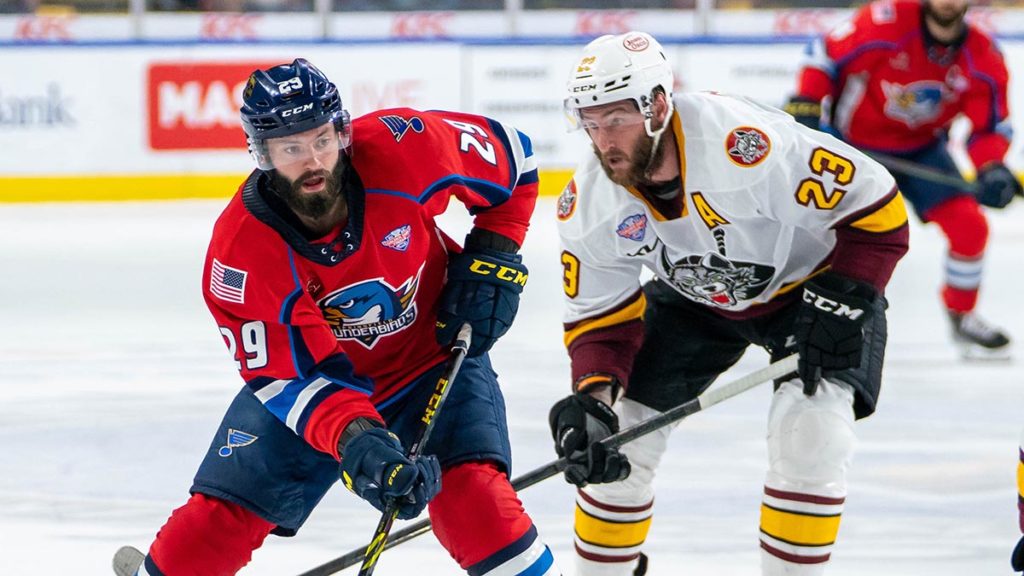
Ryan Warsofsky does not dole out praise lightly.
But the Wolves’ 4-0 win in Game 3 last night left the demanding Wolves head coach quite pleased. He wants details looked after to the smallest degree, and his players are giving them that.
A brief stumble ― three losses in the span of four outings against Stockton and Springfield ― marked the one of the more difficult stretches for the Wolves all season. But Chicago has bounced back with back-to-back convincing wins and again looks like the team that won 50 regular-season games and started 9-1 this postseason.
Extremely detailed, just like Warsofsky stresses.
“I think when we play the right way, we play with our identity and within our structure, we get a lot of offense going,” Warsofsky said last night.
“The guys did a good job. This time of year, when you defend the right way, when your play away from the puck is extremely detailed, you’ll get some offensive opportunities. We feel like we have a really hard-working team that can create ice, create space, and then we can let our skill come out. I think that’s something that we’ve preached since day one.”
Since Springfield’s two-goal third-period comeback win in Game 1, Chicago has been dominant for long stretches of play in the past two games. After racing out to a 4-0 lead in Game 2, the Wolves again scored first last night for the 14th time in 16 playoff games, building an early lead and continuing to press.
Perhaps that Game 1 setback snapped the Wolves back to attention. Warsofsky had his own view of Game 1.
“We more looked at it like we didn’t play our game,” Warsofsky explained. “We didn’t play hard enough. We didn’t look at it like we lost the lead. We looked at it like we didn’t play hard enough.”
Pyotr Kochetkov, whose 36 saves in Game 3 nailed down his second Calder Cup Playoff shutout, certainly helped as well.
“I thought Kochetkov was outstanding,” Warsofsky said.

Springfield head coach Drew Bannister wants more, and he knows that he will need more if the Thunderbirds are to wrangle control of this series back from Chicago.
For as dangerous as the Wolves can be offensively, Bannister has come away impressed by Chicago’s defensive work. After all, the Wolves did finish first in the AHL with a league-best 2.55 goals-against per game in the regular season. And when the Thunderbirds do manage to break through and earn a scoring chance, Kochetkov or Alex Lyon in net present an additional obstacle.
“They’re a good skating team,” Bannister said, “and they defend well using their speed. I think that’s been a little bit of an issue for us.”
The Calder Cup Playoffs offer National Hockey League prospects a chance to take in and manage the ups and downs of postseason play. That process requires players to learn how to adjust from one game to the next against elite competition.
So, the Springfield special teams will need to improve. The Thunderbirds are 2-for-17 on the power play in the Finals and 4-for-49 in their last 10 games (8.2 percent). Chicago’s power play, meanwhile, is 6-for-13 in the series.
“Our power play certainly has to be better for us,” Bannister said. Obviously it’s not going to win games for us. We don’t expect it to. But we do expect it to chip in.”
One adjustment did please Bannister more. The Wolves have repeatedly punished playoff opponents with their play off the rush, but Bannister was happier with his club’s work against that weapon in Game 3.
Puck details will continue to be emphasized.
“We haven’t done a very good job in the last two games, putting pucks in areas that we can get back to, and they’re able to bypass some of our pressure and get above us here quick,” Bannister said.
“Right now we’re not working to get to areas that we need to and sometimes it’s tough areas that you have to go to. We’re not doing that consistently enough, whether it’s the power play or 5-on-5. We’ve got to get better at that if we want to make life more difficult on their goaltender.”
― Patrick Williams



